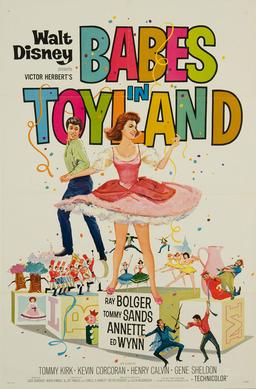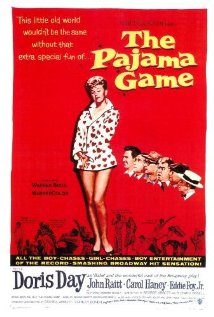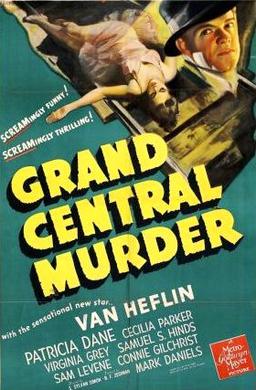Original 1927 version
- Act I
World War I is over, the Roaring Twenties have arrived, and college campuses, such as fictional Tait College, are as much a social scene as an academic one ("Opening Chorus"). Football star Tom Marlowe neglects his studies and fails his astronomy class, which he had to pass to play in the big game. Charles Kenyon, his astronomy professor, gives Tom one more chance to pass the exam.
Babe O'Day, a vivacious flapper, announces that she has broken up with Beef Saunders, a brawny and possessive football player. Babe wants a new boyfriend who does not care about old-fashioned rules of propriety ("Flaming Youth"). Tom asks his girlfriend Patricia to help him study for the test, but she is busy with sorority plans, so she recommends that he work with her studious cousin, Connie Lane. The boys marvel that Tom is remaining cheerful despite his circumstances, and Tom explains that college is the time for "Happy Days". Connie has a crush on Tom, but she says that she will "Just Imagine" that he is in love with her. Babe informs Bobby Randall, substitute player on the football team and Tom's roommate, that he is now her boyfriend. Connie and Tom meet to study and are initially uncomfortable working together, but soon they find they have a lot in common and similar philosophies of life ("The Best Things In Life Are Free").
Friday morning, Tom and Bobby wake up in their dormitory, and Tom leaves to meet Connie to study. A door-slamming farce follows during which Babe, Beef, Kearney (the football team's trainer), and Sylvester, a freshman who idolizes Tom, all end up in Tom and Bobby's dorm room, and Bobby must keep the men from finding out that Babe is there.
Couples walk together "On the Campus". Flo, an outspoken, energetic girl, leads the students in dancing the "Varsity Drag". Bobby tries to tell Babe he loves her but says he is too nervous to say it ("Baby! What?").
Tom takes his exam, but he later admits to Connie that during the test, he could not focus on astronomy; he was thinking about her. Tom declares that with Connie, he is "Lucky in Love". Professor Kenyon grades Tom's test and knows that Tom deserves a failing grade, but because Kenyon is an alumnus of Tait and a loyal football fan, he keeps that secret and instead gives Tom the lowest passing grade so he can play in the big game. At the pep rally that evening, the students sing the "Tait Song" as the school band plays. Bobby announces that if Tom wins the game tomorrow, Patricia has promised to marry him. During a chorus of "Lucky in Love", Connie faints and falls into Tom's arms ("Finaletto").
- Act II
On Saturday, Patricia's sorority, Pi Beta Phi, is hosting a luncheon ("The Girl of the Pi Beta Phi"). The girls are excited about the football game ("Today's the Day"). Babe asks Bobby, who has been flirting with other girls, why he will not commit to her, and Bobby, who has sat on the bench all season and does not expect to play in the big game at all, tells her if he wins the game, he will marry her ("In the Meantime"). Connie confronts Tom and tears up her ticket to the game because she does not want to watch him win for Patricia, and Tom tells her he would rather lose the game. Flo says that she knows Tait is going to win and "Good News" must be on its way.
Outside the entrance to the football field, Connie meets Professor Kenyon, who is on his way to the game. Professor Kenyon tells her the truth: Tom did not deserve to pass the test, but to help the football team, he gave Tom the passing grade. Babe explains to Connie that Tom did not betray her—a long time ago, after a wild party involving homemade gin, Tom wrote a letter proposing to Patricia, and Patricia has kept the letter and is holding him to it.
At the end of the first half of the game, the score is 3–0 against Tait. Coach Johnson decides to let Bobby play in the second half. When the second half is almost over, Tom gets the ball and runs for a touchdown, but he is tackled by the opposing team. He fumbles the ball, and it flies in the air and improbably lands in Bobby's arms, and Bobby scores the winning touchdown. The students leave the game celebrating the victory ("Good News" (reprise)). Tom tells Connie, who watched the game through a knothole in the fence surrounding the stadium, that he fumbled because he knew he could not win the game for Patricia. He worries that his chances of being named for the All-American team are gone, but Connie helps him remember that "The Best Things in Life Are Free" (reprise). He asks Connie if she would marry him if he did not have to marry Patricia, and she says she would.
That evening, a dance is held at the boathouse ("Varsity Drag" (reprise)). Babe tells Bobby that since neither of them expected for him to win the game, he does not have to marry her. Bobby says he wants to marry Babe; everyone else thinks he is a football hero, but she knows who he really is. Patricia, not wanting to marry a man who is not really in love with her, tells Tom that he can marry Connie instead. The news spreads that Tom has been named to the All-American team. Tom and Connie meet Professor Kenyon, whom Tom resents for failing him the first time. Connie explains to Tom that Professor Kenyon passed him even though he did not deserve it. Tom realizes he has misjudged Kenyon and shakes his hand. After a final chorus of "Good News", Tom and Connie embrace.
Revised 1993 version
- Act I
Tait College is still caught up in the social scene of the Roaring Twenties, and star football player Tom Marlowe is expected to lead the football team to victory ("Good News"). All the sorority girls are crazy about Tom ("He's a Ladies' Man"), but he is off limits since he is currently romancing Patricia Bingham, whose father is of one of the college's wealthiest benefactors. The football team, under the guidance of superstitious team trainer Pooch Kearney, is on the practice field getting ready for Saturday's Big Game against archrival Colton College ("The Football Drill"). Meanwhile, Bobby Randall, a substitute on the football team, is pleasantly shocked when Babe O'Day, a stylish flapper, pursues him. Babe has broken up with hulking Beef Saunders, her old boyfriend, and is looking for a new man ("Button Up Your Overcoat").
Sylvester (a college freshman whom no one knows the last name of) found out that Tom has neglected his studies and has failed his astronomy final, which he needed to pass in order to play in the Big Game. Astronomy professor Charlotte Kenyon agrees to give Tom one more chance with a make-up exam. Privately Professor Kenyon tells Connie Lane, a studious coed, about her lost college romance with a football player (who is now the Tait football coach), and Connie wishes she could fall in love ("Together/My Lucky Star"). Football Coach Johnson, meanwhile, tells his confidant Pooch that he and Professor Kenyon dated and broke up in college ("Together"). They ask Patricia if she would tutor Tom for his exam, but she has to choose new drapes for the sorority house that night, and recommends her cousin Connie instead. As couples stroll romantically "On the Campus", Connie and Tom meet at the library to study. After an awkward beginning, Tom and Connie soon realize they have a lot in common and similar philosophies of life ("The Best Things In Life Are Free"). Across campus, Coach Johnson nostalgically serenades Professor Kenyon, hoping she will go easy when Tom retakes his exam. Initially charmed, she responds warmly ("You're The Cream in my Coffee"), but soon realizes he is trying to manipulate her and angrily sends him away.
The next morning, Tom takes his make-up exam as the students nervously await the results in the Malt Shoppe. Babe insists that they can not let school depress them and teaches everyone the latest dance, "The Varsity Drag". Sylvester bursts into the Malt Shoppe shouting that Tom has passed the test, and Tom finds Connie to tell her that he could not have done it without her help, declaring that she has made him "Lucky In Love". Babe tells Bobby she is in love with him, and even though Bobby's scared of Beef (who still considers Babe his girl), he agrees that they might be "Lucky In Love", too. Patricia interrupts everyone to publicly announce that her wealthy father has announced he will double his donation to the athletic department if Tom wins the Big Game for Tait and marries Pat. Connie is shocked, and Tom is dumbstruck as the students joyously sing another chorus of "Lucky in Love".
- Act II
It is Saturday, and "Today's the Day" of the big game against Colton. Pat and the sorority girls are terribly excited, but are briefly saddened when they realize this is the last football game they will ever attend as students ("The Girl of the Pi Beta Phi")! Bobby stops by the sorority open house (after all, they might have sandwiches) and commits to Babe ("Never Swat a Fly"), but only if they win the game. The students head to the Big Game singing "The Tait Song" as Pat tries to pressure Tom into marrying her. Tom feels that Tait's whole athletic program is at stake, and reluctantly tells Connie he can not stay with her. Connie resigns herself to "Just Imagine" Tom is still there with her.
The game begins, but Tom is so upset about Connie that by halftime, Tait is far behind Colton. Pooch urges the team to "Keep Your Sunny Side Up", while Professor Kenyon tries to persuade Babe and Connie that the three of them should devise a strategy to pursue their men, and help them win the game. Through their combined efforts, Bobby scores an unexpected touchdown, Tait wins the big game, Sylvester is William Randolph Hearst's nephew who knows Bobby told the paper that Tom planned the game, and the happy couples, Tom and Connie, Bobby and Babe, and Coach Johnson and Professor Kenyon, all end up together ("Finale").















